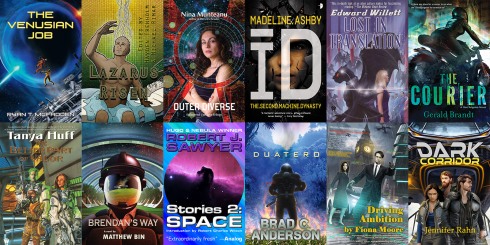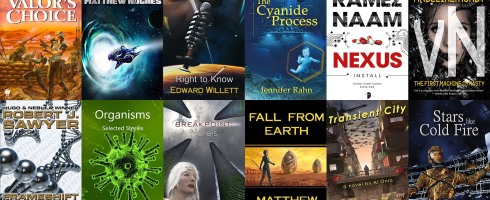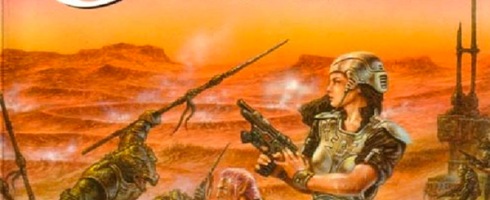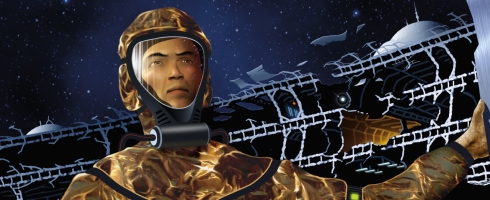A great bundle of science fiction books is currently being offered at https://storybundle.com/scifi, consisting of six titles from Bundoran Press and six by some great writers who have befriended the press over the years. We did a number of interviews with authors and this is what they had to say.
Plotting and Pantsing
I’m definitely a plotter: each book or story has a long runway before it really gets started, and I’ve been a devoted follower of the Church of the Holy Index Card ever since I read David Gerrold’s The Trouble With Tribbles as a twelve-year-old and learned how to break down a plot. (I bought it at the late, lamented House of Speculative Fiction in Ottawa; I’ve still got a bookmark around somewhere which I really should get laminated.) – Matthew Johnson
Combination, though I skew heavily towards pantser. There’s a cartoon that most scientists have encountered of two mathematicians standing at a blackboard, on which is written a series of formulae at top left and bottom right, with “and then a miracle occurs” written in the centre. Which pretty much describes my process of getting from an idea of the beginning to some vague notion of the end. Each of my projects has a paper notebook (or more than one), and a project can’t really get rolling until I find my preferred notebook (so I have a LOT of notebooks), which gets filled up with checklists of scenes to be written, possible names for people and place, multi-page scrawled plot-bashing sessions and Smeagol vs Deagol arguments with myself about who is doing what and when and why, messy timelines with many arrows and bubbles, coarse sketches of maps so I at least can keep the eight points of the compass straight, book lists, literature searches, and research notes. What my primordial entries describe usually bears little resemblance to the book that finally condenses in the end. – Alison Sinclair
I was a pantser, but found that going back to fix things later is so much more work. Now I’m a plotter. It may not all come at once, and I may end up plotting and writing the first part of a novel before plotting the next, but I find that at least having a skeleton outline makes the entire process go so much more smoothly. – Jennifer Rahn
I’m a pantser. I start a book with a character in characteristic motion, then have something happens that begins a conflict. A third to halfway through, I begin to see what the story is about, in thematic terms, which tells me roughly how it has to end. Then I write toward that ending. I don’t do much rewriting. It’s as if the story is already known to the guy in the back of my head who feeds it to me, a thousand words at a time. My first drafts therefore come out at about 90 per cent of the finished product. – Matthew Hughes
I’m not a big plotter, but I need what I call a “keel” before I start writing. Just as a keel gives a boat balance and keeps it floating upright, a story-keel gives the essence of a book: why I’m writing it and what I want to hold onto, no matter what directions the plot and characters might go. In practice, a keel is just a few sentences of content I consider non-negotiable. Beyond that, I let myself improvise and follow serendipity. – James Alan Gardner
I am definitely a pantser. I revel in the ideas which appear once I start typing. I outline as I go, seldom more than a few chapters ahead. I know the overall arc most times but I don’t commit to anything until at least half way through the first draft. I do prefer the energy and idea flow which accompany the first draft of any project. Re-writing is hard but the reward in it is the resonance one can control to give the work more substance. – Al Onia
I’m a combination plotter/pantser. I write fairly detailed synopses—say, five or six single-spaced pages—but I also discover much of the story along the way. In my novel Terra Insegura (published by DAW Books, the sequel to the Aurora Award-winning Marseguro), I introduced a minor viewpoing character primarily because I needed someone in orbit while my other viewpoint characters were down on Earth. But that character soon became central to the plot, to the point where I had to stop about three-quarters of the way through and replot everything to the end, my synopsis no longer being applicable. In my recent novel The Cityborn (also DAW Books), I was about two-thirds of the way through the writing before I finally realized what the book was really about—the theme, not the plot. The actual writing, the interaction of the characters, and the details of the world I’d created, much of it on the fly, came together to reveal something I hadn’t fully grasped when I began drafting the novel.
As host of the podcast The Worldshapers (www.theworldshapers.com), in which I interview other science fiction and fantasy authors about their creative processes, I ask this same question, more or less. Every author’s approach is different, with some doing little outlining and some doing such a detailed outline literally nothing is left to chance during the actual writing. I think the former would be too chaotic and the latter too confining for me, so I’m definitely somewhere in the middle. – Edward Willett
Writing Everyday
I may write everyday for a few weeks at time, but I’m not that consistent about it. I like to ride the wave of motivation that hits now and then. – Jennifer Rahn
The only time I could write every day is when the novel has hit its last third, the plot has developed its own inevitability, and it all starts rolling downhill. I don’t usually get to, because work and life. – Alison Sinclair
I do write every day (if you also count rewriting/editing), but I’m not necessarily writing fiction every day. As a fulltime freelance writer, I write a lot of non-fiction as well, so what I’m writing from day to day depends on the current projects I’ve taken on and when their deadlines are.
I learned long ago not to depend on a muse: one thing being a newspaper reporter teaches you is that when you sit down at the keyboard, you have to produce, because the newspaper is going to come out no matter what, and you’d better have your story ready to go into it. It’s one reason I think print journalism isn’t a bad place for any wannabe writer to start: better, I honestly think, than a creative writing degree. – Edward Willett
I write every day, whether I’m creating, re-writing or editing. I strike a time balance which allows progress, ultimate completion but doesn’t drain the muse. – Al Onia
When I’m working on something, which is most of the time, I try to do a thousand words a day. I’ll sometimes do more or less if I’m finishing a scene. I don’t have a regular place to work because for the past eleven years I’ve been a homeless drifter, i.e., an itinerant housesitter, living in other people’s houses and looking after their property and pets. It’s a natural extension of how I lived when I was young, when my family’s peripatetic way of life led me to think of myself as “a guy who’s just passing through.” As I said above, I’m an outlier. – Matthew Hughes
Unfortunately my work at MediaSmarts occupies a lot of the same mental bandwidth and energy as writing (partly because it involves a fair bit of writing, even a bit of fiction now and then) so it’s hard for me to switch gears for just a few hours: I usually need at least a half a day free to get any writing down, which hasn’t done much for my productivity over the last few years. – Matthew Johnson
To learn more about this great bundle of books, visit https://storybundle.com/scifi.
To connect with Bundoran Press, visit our web-site, like us on Facebook or follow us on Twitter @BundoranPress
 Before I say anything else, let me remind you of our bundle of books – you can get 12 books for $15 at
Before I say anything else, let me remind you of our bundle of books – you can get 12 books for $15 at 



